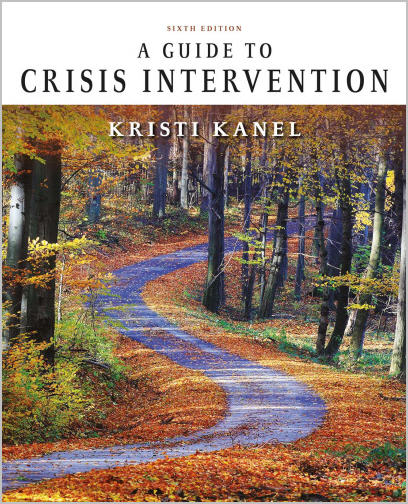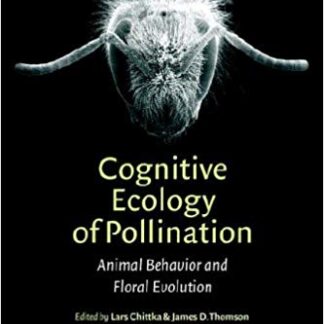Description
A Guide to Crisis Intervention 6th Edition by Kristi Kanel, ISBN-13: 978-1337566414
[PDF eBook eTextbook] – Available Instantly
- Publisher : Cengage Learning
- Publication date : January 1, 2018
- Edition : 6th
- Language : English
- 352 pages
- ISBN-10 : 9781337566414
- ISBN-13 : 978-1337566414
NOTE: This book is a standalone book and will not include any access codes.
Handle any crisis situation with the help of this practical, nuts-and-bolts guide.
A GUIDE TO CRISIS INTERVENTION, 6th Edition covers the fundamentals of situational and developmental crises, how they occur and how you can manage them. Author Kristi Kanel discusses traditional counseling models as they relate to crisis intervention, and shows how they’re incorporated into her ABC Model of Crisis Intervention–which you can use in any mental health setting with anyone in crisis. Examples illuminate the psychological and behavioral dynamics associated with crisis situations. Cases and scripts help you learn exactly what to say to clients, whether the crisis is developmental; related to trauma, post-traumatic stress disorder (PTSD), substance abuse or other factors; or arises from personal victimization. You’ll also learn how to conduct suicide assessments and mental status exams.
Table of Contents:
Cover Page
Title Page
Copyright Page
Dedication
Preface
Acknowledgments
About the Author
1. An Overview of Crisis Intervention
Crisis Defined
Crisis as Both Danger and Opportunity
Crisis as Opportunity
Crisis as Danger: Becoming a Crisis-Prone Person
Other Factors Determining Danger or Opportunity
Precipitating Events
Developmental Crises
Situational Crises
Emotional Distress
Failure of Coping Methods and Impairment in Functioning
The Wellesley Project: The Development of Crisis Intervention
Crisis Intervention and Suicide Prevention Strengthen Nationwide
Community Mental Health Act of 1963
The Rise of Managed Care
Contributions from Other Theoretical Modalities
Psychoanalytic Theory
Existential Theory
Humanistic Approach
Cognitive-Behavioral Theories
Brief Therapy
Critical Incident Stress Debriefing
Trauma-Informed Care
The ABC Model of Crisis Intervention
Chapter Review Questions
References
2. Ethical and Professional Issues
Introduction
The Need for Ethics
What Are Ethics?
Defining Law
Controversies
Use of Paraprofessionals
Ethical Issues
Self-Awareness and Self-Monitoring
Dual Relationships
Confidentiality
Elder Abuse Reporting Act
Child Abuse Reporting Act
Competence
Client’s Rights
Virtual or e-Therapy
Multicultural Competence
Chapter Review Questions
References
3. The ABC Model of Crisis Intervention
A: Developing and Maintaining Rapport: Follow the Client
Attending Behavior
Questioning
Clarifying
Paraphrasing
Reflection of Feelings
Summarization
B: Identifying the Problem: Follow the Model
Identifying the Precipitating Event
Recognizing the Meaning or Perception of the Precipitating Event
Identifying Emotional Distress and Functioning Level
Making Ethical Checks
Substance Misuse/Abuse Issues
Therapeutic Interaction
C: Coping
Exploring the Client’s Own Attempts at Coping
Encouraging the Development of New Coping Behaviors
Presenting Alternative Coping Behaviors
Commitment and Follow-Up
Case Example: Using the ABC Model of Crisis Intervention with a Survivor of Military Sexual Trauma
Chapter Review Questions
References
4. Intervening with Crises Related to Danger to Self, Others, or Being Gravely Disabled
Introduction
A Brief History of Suicide
Introduction to Suicide
Current Suicide Statistics
Symptoms and Clues
Suicide Assessment
Interventions
Discussion of Risk Level and Intervention Strategies
Low-Risk Suicidal Clients
Middle-Risk Suicidal Clients
High-Risk Suicidal Clients
A Phenomenological Look at Suicide
Non-Suicidal Self-Injury (NSSI) and Self-Mutilative Behavior (SMB)
Assessment of NSSI
Interventions for NSSI
Managing a Client Who Is a Danger to Others
Risk Factors for Violence Against Others
Psychotic Breakdowns and Gravely Disabled Mentally Ill Persons
The Mental Status Exam
Chapter Review Questions
References
5. Developmental and Cultural Crises
Introduction
A Brief Review of the Life Cycle Crises
Cognitions Association with FOMO
Consequences of FOMO
Emotional Distress and Impairments in Functioning
The Quarter-Life Crisis
Family Systems Theory
Structural Family Therapy
Evolutional Crises
First Stage of a Family: Creating a Marital Subsystem
Creating a Parental Subsystem
Creating Sibling Subsystems
Creating Grandparent Subsystems
Crisis Related to Culture
Development of Cultural Humility
Etic versus Emic Issues
Emic Patterns Related to Latinos
Issues Related to Different Rates of Acculturation
Ataque de Nervios
Emic Issues Related to African American Families
Religion
Racism
Black Lives Matter
Emic Issues Related to Asian American Families
Asian American Family Structure
Shame and Obligation in Asian American Culture
Communication Process in Asian American Culture
Chapter Review Questions
References
6. Crises of Loss: Death, Relationship Breakups, and Economic Loss
Death and Dying
Kübler-Ross’s Five Stages of Death and Dying
Tasks of Mourning
Manifestations of Normal Grief
Determinants of Grief
Intervention
Suggestions for Those Suffering Loss
Losing a Child
Divorce and Separation
Intervention
Children and Divorce
Crises Related to Blended Families
Job Loss
The Role of Perceptions
Interventions
Chapter Review Questions
References
7. Community Disaster, Trauma, and Posttraumatic Stress Disorder
Trauma-Informed Care
Posttraumatic Stress Disorder (PTSD)
Traumas That Often Lead to PTSD or Acute Stress Disorder
Effects on Young Children
Military Service
Personal and Family Victimization
Natural Disasters
Material Resources
Four Phases of Community Disasters
Intervention Guidelines
Man-Made Disasters
Terrorism
Gun Violence and Shootings
Interventions
Critical Incident and Debriefing
Debriefing Process
Other Therapeutic Approaches Commonly Used to Treat PTSD
Secondary Posttraumatic Stress Disorder
Chapter Review Questions
References
8. Crises Related to Military Service
Serving in the Military: An Historical View
Introduction to the Population of OIF and OEF Veterans
Statistics
Military Culture
Issues Particular to These Veterans
Invisible Wounds
PTSD
Depression and Suicide
Anger Issues
Alcohol Misuse
Treatment of PTSD and Depression, Anger, and Alcohol Misuse resulting from PTSD
Traumatic Brain Injury
Other Treatment Approaches to Help Veterans with PTSD, Depression, TBI, Alcohol Misuse, Anger, and Combat Stress
Issues Facing the Families of Veterans
Issues Facing College Enrolled Veterans
A 2008−2009 Research Study of OIF and OEF Veterans and PTSD
General Interventions
Military Sexual Assault
Military Sexual Trauma
Chapter Review Questions
References
9. Crises Related to Personal Trauma
Sexual Assault and Rape
What Is Rape?
What Is Sexual Assault?
Interventions with a Rape Victim
The Empowerment Model with Sexual Assault Survivors
Date and Acquaintance Rape
Intimate Partner Violence
A Historical Perspective
Cultural Factors and Universal Factors Related to Intimate Partner Abuse
Prevalence of Intimate Partner Abuse
Why Do People Stay?
The Battering Cycle
Battered Woman Syndrome
Intervening with Battered Women
The Batterer
A Phenomenological View of the Batterer
Interventions with the Batterer
Child Abuse Issues
Types of Child Abuse
How to Detect Child Abuse and Neglect
Presumptive Indicators of Child Sexual Abuse
Infant Whiplash Syndrome
Association of Child Abuse with Posttraumatic Stress Disorder
Reporting Child Abuse
Interventions with an Abused Child
The Battering Parent
Interventions for Adults Who Were Sexually Abused as Children
Intervention for Perpetrators of Sexual Abuse
Bullying
Definition
Statistics
Intervention Strategies
Working with Families and Victims
Working with Families and the Bully
Chapter Review Questions
References
10. Crises Related to Sexuality
Teen Pregnancy
Issues Related to Abortions
Why Do Women Have Abortions?
How Does Abortion Affect the American Man?
Issues Related to Sexually Transmitted Infections (STIs)
Hepatitis C
Crisis Intervention for Individuals and Couples Dealing with STIs
AIDS and HIV
Trends among Particular Groups
What Is AIDS?
Modes of Transmission
AIDS Testing
Treatment
Social Aspects
Type of Clients Who May Seek Crisis Intervention Related to HIV/AIDS
Interventions
Issues Facing Individuals Who Identify as Gay, Lesbian, Bisexual, Transgender, Gender Variant, Gender Fluid, or Queer
Issues Facing Individuals Who Identify as Transgender/Gender Variant/Gender Fluid
Chapter Review Questions
References
11. Substance Use Related Disorders and Crises
An Historical Perspective of Substance Abuse and Misuse in the United States
Drug Use Statistics in the Twenty-First Century for the United States
What Is Substance Abuse
What Might Trigger a Substance Abuse Crisis?
Family Crises
Medical Crises
Legal Crises
Psychological Crises
Alcohol: The Most Common Drug of Abuse
The Alcoholic
Intervention with Alcohol and Substance Abusers
Medical Approaches
The Addiction Vaccine
Other Approaches Focusing on Treating Substance and Alcohol Abuse
Brief Intervention for Alcohol Problems
Understanding Enabling Behavior
Adult Children of Alcoholics
Treatment for the Codependent
Other Substance Abuse Issues
Speed: Cocaine, Crack, and Crystal Meth
Effects of Cocaine and Speed on the Family
Marijuana
Lysergic Acid Diethylamide (LSD)
Heroin
Prescription Drug Misuse and Abuse
Chapter Review Questions
References
12. Crises Related to Aging, Serious Physical Illness, and Disabilities
Palliative Care
The Biopsychosocial Model
Serious Illnesses
Chronic Pain
Eating Disorders
Alzheimer’s Disease
What Is Alzheimer’s Disease?
Effects on the Caretaker
Issues Related to Disabilities
A Brief History of Disabilities
The Disabled Population and the Americans with Disabilities Act (ADA)
Vulnerable Subgroups Within the Disabled Population
Disabled Elderly People
Elder Abuse
Interventions with Abused Elderly People
Mentally Disabled People
Developmentally Disabled People
Crisis Intervention Strategies for Persons with Disabilities
Chapter Review Questions
References
Kristi Kanel (Ph.D., University of Southern California) is a Full Professor at California State University, Fullerton in the Department of Human Services where she has been teaching for over 31 years. She is the author of A GUIDE TO CRISIS INTERVENTION, 5th Edition; HUMAN SERVICE DELIVERY TO LATINOS, 2nd Edition; and AN OVERVIEW OF THE HUMAN SERVICES, 2nd Edition (with Melanie Horn-Mallers). Dr. Kanel was a practicing psychotherapist for over 25 years. Her experience as a counselor includes working at two non-profit agencies (the Anaheim Free Clinic and a battered woman’s shelter), a public agency, a managed care organization, and in private practice where she worked with a multitude of client populations, specializing in trauma. Her most recent research has focused on the mental health needs and interventions for the veterans of the Iraq and Afghanistan wars. Other research includes mental health needs of Latinos and crisis intervention practices.
What makes us different?
• Instant Download
• Always Competitive Pricing
• 100% Privacy
• FREE Sample Available
• 24-7 LIVE Customer Support




